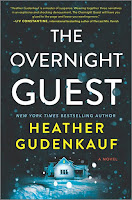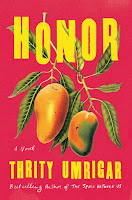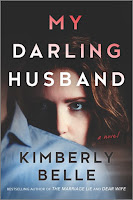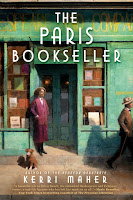Author: Heather Gudenkauf
Publication Information: Park Row. 2022. 336 pages.
ISBN: 0778333167 / 978-0778333166
Book Source: I received this book through NetGalley and a publisher's blog tour free of cost in exchange for an honest review.
Opening Sentence: "On August 12, 2000, Abby Morris, out of breath with sweat trickling down her temple, was hurrying down the gray ribbon of gravel road for her nightly walk."
Favorite Quote: "It isn't the dark you should be afraid of, the girl thought, it's the monsters who step out into the light that you need to fear."
***** BLOG TOUR *****
Review
Reader beware: The book features violent crimes and abuse. Read the book expecting that.
August 2000. Present day. The quiet small town of Burden, Blake County, Iowa. One horrible crime in the past. The possible makings of another in the present. Both centering around the same idea. "Homes were supposed to be safe havens, meant to protect. It was supposed to be a shelter from the elements, a fortress to keep out evil, and her home had betrayed ... in the worst possible way."
August 2000. A brutal murder on a quiet farm in a town that sees barely any crime. Young Josie survives, and young Becky disappears. Where does the investigation lead? How and why does this happen? Who is responsible. As in This is How I Lied, there are two girls, there is the Iowa setting, and there is a crime that no one is ever convicted of.
Present day. Wylie Lark is a true crime writer, exploring old crimes and telling the stories of the who, what, where, when, and why. She is in Burden, Iowa in the house in which the crime occurred in 2000. She is writing the story of the crime and comes to the place to finish up. A major snowstorm isolates her in the home. She finds a child in the snow and then a woman. As in This is How I Lied, there are two timelines and two investigations.
Embedded between the two is a third story where time is not specified. That story is of a woman and her daughter kept locked up in a basement room. Occasionally, Dad visits bringing food. With Dad also comes fear, abuse, and violence. The woman, the girl, and the dad are never identified by name.
The story winds back and forth between the three. At the beginning, the connections are unclear but the threads are pulled together, some contrived but some in unexpected ways. A woman and a child happen to crash in front of a house. The house happens to be the one Wylie is staying in. That happens to be the house in which the crime was committed. All convenient, but in this case, it does not interfere with the enjoyment of the story. It had to be brought about in some way. The twists that do come are enough to make the story not feel contrived.
Little Mercies was predictable, but this book surprises me with its twists but in a really good way. I do not see them coming, but once revealed, my reaction is, "Of course!". That, for me, makes a mystery and thriller work. If I see all the twists coming, then a story is less engaging to follow. If the twist seems to come out of left field, then the dissatisfaction is that I could not have seen that coming, and what was the point of the read anyways. This book manages to find that balance. I keep turning pages before and after the twists to see what is next.
About the Author
Heather Gudenkauf is the critically acclaimed author of several novels, including the New York Times bestseller The Weight of Silence. She lives in Iowa with her husband and children. Her Q&A for the blog tour of This is How I Lied references the first draft of this book.About the Book
In a snowstorm, the safest place is home. Or is it?True crime writer Wylie Lark doesn’t mind being snowed in at the isolated farmhouse where she’s retreated to write her new book. A cozy fire, complete silence. It would be perfect, if not for the fact that decades earlier, at this very house, two people were murdered in cold blood and a girl disappeared without a trace.
As the storm worsens, Wylie finds herself trapped inside the house, haunted by the secrets contained within its walls—haunted by secrets of her own. Then she discovers a small child in the snow just outside. How long had the child been there? Where did he come from? Bringing the child inside for warmth and safety, she begins to search for answers. But soon it becomes clear that the farmhouse isn’t as isolated as she thought, and someone is willing to do anything to find them.
Excerpt
Excerpted from The Overnight Guest by Heather Gudenkauf, Copyright © 2022 by Heather Gudenkauf. Published by arrangement with Harlequin Books S.A.
Three
“Maybe we can go outside and play?” the girl said as she peeked around the edge of the heavy curtain that covered the window. The sky was gray and soft drops of rain tapped at the glass.
“Not today,” her mother said. “It’s raining and we’d melt.”
The girl gave a little laugh and then hopped off the chair she had dragged beneath the window. She knew her mother was teasing. They wouldn’t actually melt if they went out in the rain, but still, it made her shiver thinking about it—stepping outside and feeling the plop of water on your skin and watching it melt away like an ice cube.
Instead, the girl and her mother spent the morning at the card table cutting pink, purple, and green egg shapes from construction paper and embellishing them with polka dots and stripes.
On one oval, her mother drew eyes and a pointy little orange beak. Her mother laid the girl’s hands on a piece of yellow paper and traced around them using a pencil. “Watch,” she said as she cut out the handprints and then glued them to the back of one of the ovals.
“It’s a bird,” the girl said with delight.
“An Easter chick,” her mother said. “I made these when I was your age.”
Together, they carefully taped the eggs and chicks and bunny rab-bits they created to the cement walls, giving the dim room a festive, springy look. “There, now we’re ready for the Easter Bunny,” her mother said with triumph.
That night, when the girl climbed into bed, the butterflies in her stomach kept chasing sleep away. “Stay still,” her mother kept re-minding her. “You’ll fall asleep faster.”
The girl didn’t think that was true, but then she opened her eyes, a sliver of bright sunshine was peeking around the shade, and the girl knew that morning had finally arrived.
She leaped from bed to find her mother already at the tiny round table where they ate their meals. “Did he come?” the girl asked, tucking her long brown hair behind her ears.
“Of course he did,” her mother said, holding out a basket woven together from strips of colored paper. It was small, fitting into the palm of the girl’s hand, but sweet. Inside were little bits of green paper that were cut to look like grass. On top of this was a pack of cinnamon gum and two watermelon Jolly Ranchers.
The girl smiled though disappointment surged through her. She’d been hoping for a chocolate bunny or one of those candy eggs that oozed yellow when you broke it open.
“Thank you,” she said.
“Thank the Easter Bunny,” her mother said.
“Thank you, Easter Bunny,” the girl crowed like the child on the candy commercials that she’d seen on television. They both laughed.
They each unwrapped a piece of gum and spent the morning making up stories about the paper chicks and bunnies they made.
When the girl’s gum lost its flavor, and she had slowly licked one of the Jolly Ranchers into a sharp flat disc, the door at the top of the steps opened, and her father came down the stairs toward them. He was carrying a plastic bag and a six-pack of beer. Her mother gave the girl a look. The one that said, go on now, mom and dad need some alone time. Obediently, the girl, taking her Easter basket, went to her spot beneath the window and sat in the narrow beam of warm light that fell across the floor. Facing the wall, she unwrapped another piece of gum and poked it into her mouth and tried to ignore the squeak of the bed and her father’s sighs and grunts.
“You can turn around now,” her mother finally said. The girl sprang up from her spot on the floor.
The girl heard the water running in the bathroom, and her father poked his head out of the door. “Happy Easter,” he said with a grin. “The Easter Bunny wanted me to give you a little something.”
The girl looked at the kitchen table where the plastic bag sat. Then she slid her eyes to her mother, who was sitting on the edge of the bed, rubbing her wrist, eyes red and wet. Her mother nodded.
“Thank you,” she murmured.
Later, after her father climbed the steps and locked the door behind him, the girl went to the table and looked inside the plastic bag. In-side was a chocolate bunny with staring blue eyes. He was holding a carrot and wore a yellow bowtie.
“Go ahead,” her mother told the girl as she held an ice pack to her wrist. “When I was little, I always started with the ears.”
“I don’t think I’m very hungry,” the girl said, returning the box to the table.
“It’s okay,” her mother said gently. “You can eat it. It’s from the Easter Bunny, not your dad.”
The girl considered this. She took a little nibble from the bunny’s ear and sweet chocolate flooded her mouth. She took another bite and then another. She held out the rabbit to her mother and she bit off the remaining ear in one big bite. They laughed and took turns eating until all that was left was the bunny’s chocolate tail.
“Close your eyes and open your mouth,” her mother said. The girl complied and felt her mother place the remaining bit on her tongue and then kiss her on the nose. “Happy Easter,” her mother whispered.
Three
“Maybe we can go outside and play?” the girl said as she peeked around the edge of the heavy curtain that covered the window. The sky was gray and soft drops of rain tapped at the glass.
“Not today,” her mother said. “It’s raining and we’d melt.”
The girl gave a little laugh and then hopped off the chair she had dragged beneath the window. She knew her mother was teasing. They wouldn’t actually melt if they went out in the rain, but still, it made her shiver thinking about it—stepping outside and feeling the plop of water on your skin and watching it melt away like an ice cube.
Instead, the girl and her mother spent the morning at the card table cutting pink, purple, and green egg shapes from construction paper and embellishing them with polka dots and stripes.
On one oval, her mother drew eyes and a pointy little orange beak. Her mother laid the girl’s hands on a piece of yellow paper and traced around them using a pencil. “Watch,” she said as she cut out the handprints and then glued them to the back of one of the ovals.
“It’s a bird,” the girl said with delight.
“An Easter chick,” her mother said. “I made these when I was your age.”
Together, they carefully taped the eggs and chicks and bunny rab-bits they created to the cement walls, giving the dim room a festive, springy look. “There, now we’re ready for the Easter Bunny,” her mother said with triumph.
That night, when the girl climbed into bed, the butterflies in her stomach kept chasing sleep away. “Stay still,” her mother kept re-minding her. “You’ll fall asleep faster.”
The girl didn’t think that was true, but then she opened her eyes, a sliver of bright sunshine was peeking around the shade, and the girl knew that morning had finally arrived.
She leaped from bed to find her mother already at the tiny round table where they ate their meals. “Did he come?” the girl asked, tucking her long brown hair behind her ears.
“Of course he did,” her mother said, holding out a basket woven together from strips of colored paper. It was small, fitting into the palm of the girl’s hand, but sweet. Inside were little bits of green paper that were cut to look like grass. On top of this was a pack of cinnamon gum and two watermelon Jolly Ranchers.
The girl smiled though disappointment surged through her. She’d been hoping for a chocolate bunny or one of those candy eggs that oozed yellow when you broke it open.
“Thank you,” she said.
“Thank the Easter Bunny,” her mother said.
“Thank you, Easter Bunny,” the girl crowed like the child on the candy commercials that she’d seen on television. They both laughed.
They each unwrapped a piece of gum and spent the morning making up stories about the paper chicks and bunnies they made.
When the girl’s gum lost its flavor, and she had slowly licked one of the Jolly Ranchers into a sharp flat disc, the door at the top of the steps opened, and her father came down the stairs toward them. He was carrying a plastic bag and a six-pack of beer. Her mother gave the girl a look. The one that said, go on now, mom and dad need some alone time. Obediently, the girl, taking her Easter basket, went to her spot beneath the window and sat in the narrow beam of warm light that fell across the floor. Facing the wall, she unwrapped another piece of gum and poked it into her mouth and tried to ignore the squeak of the bed and her father’s sighs and grunts.
“You can turn around now,” her mother finally said. The girl sprang up from her spot on the floor.
The girl heard the water running in the bathroom, and her father poked his head out of the door. “Happy Easter,” he said with a grin. “The Easter Bunny wanted me to give you a little something.”
The girl looked at the kitchen table where the plastic bag sat. Then she slid her eyes to her mother, who was sitting on the edge of the bed, rubbing her wrist, eyes red and wet. Her mother nodded.
“Thank you,” she murmured.
Later, after her father climbed the steps and locked the door behind him, the girl went to the table and looked inside the plastic bag. In-side was a chocolate bunny with staring blue eyes. He was holding a carrot and wore a yellow bowtie.
“Go ahead,” her mother told the girl as she held an ice pack to her wrist. “When I was little, I always started with the ears.”
“I don’t think I’m very hungry,” the girl said, returning the box to the table.
“It’s okay,” her mother said gently. “You can eat it. It’s from the Easter Bunny, not your dad.”
The girl considered this. She took a little nibble from the bunny’s ear and sweet chocolate flooded her mouth. She took another bite and then another. She held out the rabbit to her mother and she bit off the remaining ear in one big bite. They laughed and took turns eating until all that was left was the bunny’s chocolate tail.
“Close your eyes and open your mouth,” her mother said. The girl complied and felt her mother place the remaining bit on her tongue and then kiss her on the nose. “Happy Easter,” her mother whispered.
Buy Links
BookShop.orgHarlequin
Barnes & Noble
Amazon
Books-A-Million
Powell’s
Social Links
Author WebsiteInstagram: @heathergudenkauf
Twitter: @hgudenkauf
Facebook: @HeatherGudenkaufAuthor
Goodreads
Please share your thoughts and leave a comment. I would love to "talk" to you.






